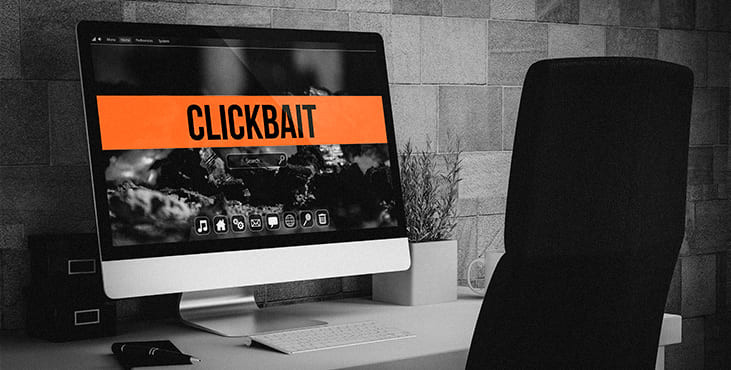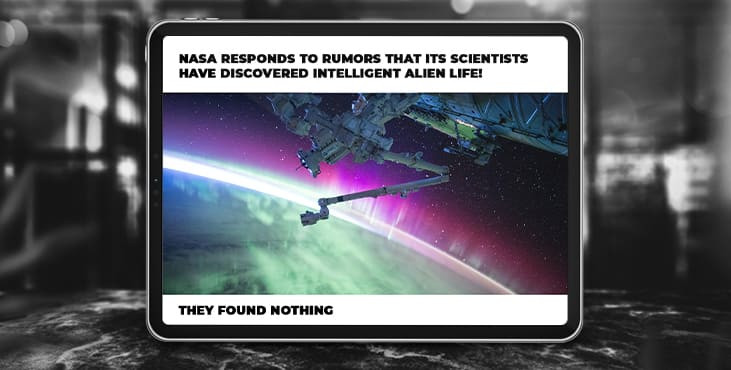
What is clickbait and does it really work?
Typically, clickbait is misleading or sensational content. It is created for the sole purpose of getting page views on a website. Sometimes publishers use clickbait to drive traffic to their site in order to make more money from ads, clicks, or conversions.
Clickbait language is more emotional than informational. Headlines like "You Won't Believe It" or "Try This Simple Trick" are meant to evoke curiosity or other strong emotions that trigger a click. However, the following content is rarely informative or verifiable. Clickbait can appear in many formats such as blog posts, banner ads, and SERP ads. For example, a clickbait title might look like this:

Is clickbait bad?
We all want to develop content that draws readers to our website. There are many content marketing techniques that can help, but none of them are SEO friendly.
Google now knows more than ever about your website content thanks to various updates. If your webpage's title, headings, and URL are irrelevant to its content, Google can penalize you, which can seriously impact your rankings.
Clickbait can also affect your:
- Digital PR. If your site is known for using clickbait headlines to attract visitors, your brand reputation may suffer in the long run.
- Bounce Rate. When a user goes to your website and doesn’t find it useful and relevant, they are more likely to leave your site, which increases their overall bounce rate.
- Backlinks. Getting links from less authoritative sites can lower your page's authority and rankings.
Is it possible to rank only by titles and keywords?
No. While some clickbait titles can drive a lot of traffic to your site, Google doesn't just take into account the number of visitors when it considers page authority and page rank. You can get hundreds of people to click through to your site every day, but if they leave because your content doesn't match the title and URL you provide, your rankings can be affected.
Recommendations for preventing clickbait use
Pay attention to page titles and heading structure. Google algorithms can understand the content of the texts on your site and check if it matches the title of the page. Google's latest update now allows the search engine to display a replacement title tag if your page's title doesn't match its content. To avoid this, make sure your page title and headings accurately reflect the content of your website.
Create SEO friendly titles
Make sure your page's title tag and titles are SEO friendly and fit with the content. Keyword research can help you discover targeted keywords that you can include in your page title and text. Using targeted keywords in all your content signals to Google that your page is relevant to your target keyword.
Matching user search intent
Like keywords, your content should be relevant to the user's search intent. There are four common types of search intents:
1. Navigation Intent. When a user wants to navigate to a specific website, they are more likely to add branded keywords to their search (e.g. Subaru website). You can target these branded keywords with ads to increase brand awareness.
2. Informational Intent. If the user wants more information on a topic, they can ask questions or use keywords that indicate they need help (e.g. What's a good car?). Target these keywords for informative content like videos, lists, or tutorials. Focus on creating useful, quality content that answers readers' questions.
3. Commercial Investigation Intent. Once your user decides they want to purchase a product or service, they will likely perform a search to compare the various options available (Subaru vs Nissan). Target these keywords with comparison articles, reviews, and guides to traffic capture products.
4. Transactional Intent. Certain keywords or phrases signal that the user is ready to buy (eg Buy Subaru Forester). These users are ready to make a purchase and are now looking for the best deal. They may be susceptible to clickbait in search of the best deals. Target these keywords with strong, SEO-optimized content that highlights your Unique Selling Proposition (USP). You can also target these keywords with ads, but make sure your CTA is clear and your landing page reflects what's in the ad.
Get an SEO Analysis for your website as a bonus
Tell us what you think
By clicking 'Submit', you agree to Privacy Policy and authorise our staff to contact you. You are liable under the Personal Data Protection Act if you key in false personal data or other people’s personal data.
offers and news
